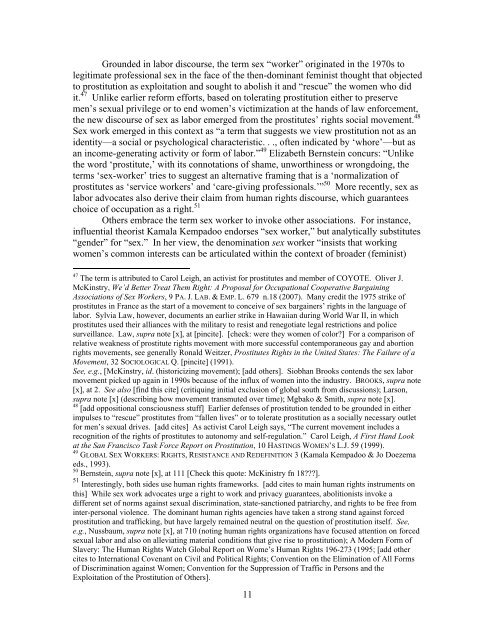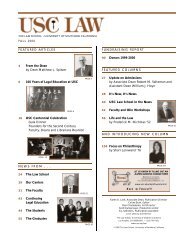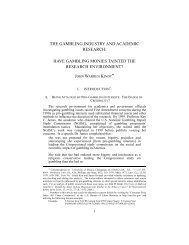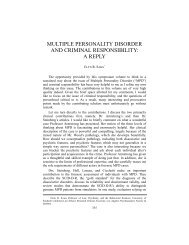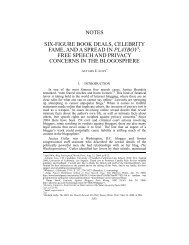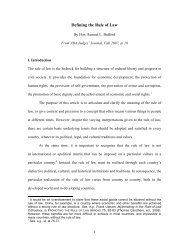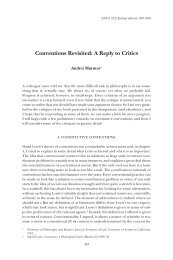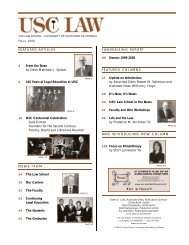1 Regulating Sex Work Adrienne D. Davis VERY ROUGH DRAFT ...
1 Regulating Sex Work Adrienne D. Davis VERY ROUGH DRAFT ...
1 Regulating Sex Work Adrienne D. Davis VERY ROUGH DRAFT ...
You also want an ePaper? Increase the reach of your titles
YUMPU automatically turns print PDFs into web optimized ePapers that Google loves.
Grounded in labor discourse, the term sex “worker” originated in the 1970s to<br />
legitimate professional sex in the face of the then-dominant feminist thought that objected<br />
to prostitution as exploitation and sought to abolish it and “rescue” the women who did<br />
it. 47 Unlike earlier reform efforts, based on tolerating prostitution either to preserve<br />
men’s sexual privilege or to end women’s victimization at the hands of law enforcement,<br />
the new discourse of sex as labor emerged from the prostitutes’ rights social movement. 48<br />
<strong>Sex</strong> work emerged in this context as “a term that suggests we view prostitution not as an<br />
identity—a social or psychological characteristic. . ., often indicated by ‘whore’—but as<br />
an income-generating activity or form of labor.” 49 Elizabeth Bernstein concurs: “Unlike<br />
the word ‘prostitute,’ with its connotations of shame, unworthiness or wrongdoing, the<br />
terms ‘sex-worker’ tries to suggest an alternative framing that is a ‘normalization of<br />
prostitutes as ‘service workers’ and ‘care-giving professionals.’” 50 More recently, sex as<br />
labor advocates also derive their claim from human rights discourse, which guarantees<br />
choice of occupation as a right. 51<br />
Others embrace the term sex worker to invoke other associations. For instance,<br />
influential theorist Kamala Kempadoo endorses “sex worker,” but analytically substitutes<br />
“gender” for “sex.” In her view, the denomination sex worker “insists that working<br />
women’s common interests can be articulated within the context of broader (feminist)<br />
47<br />
The term is attributed to Carol Leigh, an activist for prostitutes and member of COYOTE. Oliver J.<br />
McKinstry, We’d Better Treat Them Right: A Proposal for Occupational Cooperative Bargaining<br />
Associations of <strong>Sex</strong> <strong>Work</strong>ers, 9 PA. J. LAB. & EMP. L. 679 n.18 (2007). Many credit the 1975 strike of<br />
prostitutes in France as the start of a movement to conceive of sex bargainers’ rights in the language of<br />
labor. Sylvia Law, however, documents an earlier strike in Hawaiian during World War II, in which<br />
prostitutes used their alliances with the military to resist and renegotiate legal restrictions and police<br />
surveillance. Law, supra note [x], at [pincite]. [check: were they women of color?] For a comparison of<br />
relative weakness of prostitute rights movement with more successful contemporaneous gay and abortion<br />
rights movements, see generally Ronald Weitzer, Prostitutes Rights in the United States: The Failure of a<br />
Movement, 32 SOCIOLOGICAL Q. [pincite] (1991).<br />
See, e.g., [McKinstry, id. (historicizing movement); [add others]. Siobhan Brooks contends the sex labor<br />
movement picked up again in 1990s because of the influx of women into the industry. BROOKS, supra note<br />
[x], at 2. See also [find this cite] (critiquing initial exclusion of global south from discussions); Larson,<br />
supra note [x] (describing how movement transmuted over time); Mgbako & Smith, supra note [x].<br />
48<br />
[add oppositional consciousness stuff] Earlier defenses of prostitution tended to be grounded in either<br />
impulses to “rescue” prostitutes from “fallen lives” or to tolerate prostitution as a socially necessary outlet<br />
for men’s sexual drives. [add cites] As activist Carol Leigh says, “The current movement includes a<br />
recognition of the rights of prostitutes to autonomy and self-regulation.” Carol Leigh, A First Hand Look<br />
at the San Francisco Task Force Report on Prostitution, 10 HASTINGS WOMEN’S L.J. 59 (1999).<br />
49<br />
GLOBAL SEX WORKERS: RIGHTS, RESISTANCE AND REDEFINITION 3 (Kamala Kempadoo & Jo Doezema<br />
eds., 1993).<br />
50<br />
Bernstein, supra note [x], at 111 [Check this quote: McKinistry fn 18???].<br />
51<br />
Interestingly, both sides use human rights frameworks. [add cites to main human rights instruments on<br />
this] While sex work advocates urge a right to work and privacy guarantees, abolitionists invoke a<br />
different set of norms against sexual discrimination, state-sanctioned patriarchy, and rights to be free from<br />
inter-personal violence. The dominant human rights agencies have taken a strong stand against forced<br />
prostitution and trafficking, but have largely remained neutral on the question of prostitution itself. See,<br />
e.g., Nussbaum, supra note [x], at 710 (noting human rights organizations have focused attention on forced<br />
sexual labor and also on alleviating material conditions that give rise to prostitution); A Modern Form of<br />
Slavery: The Human Rights Watch Global Report on Wome’s Human Rights 196-273 (1995; [add other<br />
cites to International Covenant on Civil and Political Rights; Convention on the Elimination of All Forms<br />
of Discrimination against Women; Convention for the Suppression of Traffic in Persons and the<br />
Exploitation of the Prostitution of Others].<br />
11


